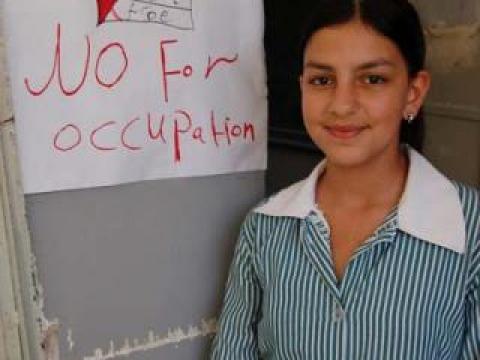“They don’t want us to learn"

JERUSALEM-WESTBANK-GAZA - “When I got to school on Tuesday, our storage room was all burned. I don’t feel safe”, says 12-year-old Nour, who echoes the feelings of many of the girls in the Al Sawiyeh Girls School in South Nablus.
Looking out from the entrance of the school onto the main road, several blocs from the settlement complex of Eli dot the nearby horizon. The proximity of the settlement complex has long been a source of tension and fear for the school and community of Al Sawiyeh.
Violent incidents have overshadowed the school for years. The previous one-story school was burned to the ground at the beginning of the second “intifada” (uprising) in 2000. In March this year, two men entered the school courtyard; one held the students and teachers at gun point, while the other climbed to the roof of the school and tore down and destroyed the Palestinian flag flying there.
Just recently, sometime during the night of October 19, the padlock on a side gate was broken, and flammable liquid — apparently brought in plastic drink bottles — was set on fire, igniting sports mats and equipment in the school storage room.
Fortunately the damage was not as extensive as it could have been because a water pipe in the storage room melted during the fire, releasing water that extinguished the fire and prevented it from spreading to the rest of the school. Messages on the front gate and wall of the school spray-painted in Hebrew letters read, “Greetings from the hills” and “Good thing we are not gentiles.”
Scared, angry girls walked around confused after coming to school to find their storage room burned.
“The girls were so scared. I don’t feel safe. None of us feel safe. They could come back at any time and burn anything. We could be in the school (next time),” says 12-year-old Nour. If she could say anything to the people that did this, Nour would say, “Please don’t come and hurt us or shoot us.”
“How can they do this? Why did they come to our school? It’s so horrible. If I could, I would say to my friends in America, ‘Don’t worry.’” Najeia, 12, wants to comfort the friends she made when she lived abroad, but she and her fellow students are the ones that need the most reassurance.
The head teacher and the local mayor are worried about the girls. They stand in the water covering the floor of the charred storage room. “Imagine if you go into your home and find someone has burnt it… How would you feel safe going back in, sitting, or sleeping in your home? What assurance do we have that tomorrow they won’t come back while the girls are still in the school?” asks the teacher.
"This school is supposed to be secure; a safe place for the children. But they (Israeli settlers) have broken in and set fire to it," says the mayor of Al Sawiya, Mahmoud Asaad.
World Vision continues to work with the school, while the community and girls try to make sense of a senseless act of violence. At the heart of this story are the children. These children, like all others, have the right to live in a world they feel is safe, free from violence, suffering, and fear. Their stories are demanding to be heard.
The occupation continues to eat away the quality of life for all children, destroying their sense of security, safety, and undermining their spirit.
The fear in the children is clear but eighth-grade student Maysoon doesn’t want to give in. "I feel they don't want us to learn, and they want to burn our school. But we can fight- we can stay at school and keep learning. We want to stay. We want to learn." She adds passionately, "Just like they have rights, we want ours as well.”